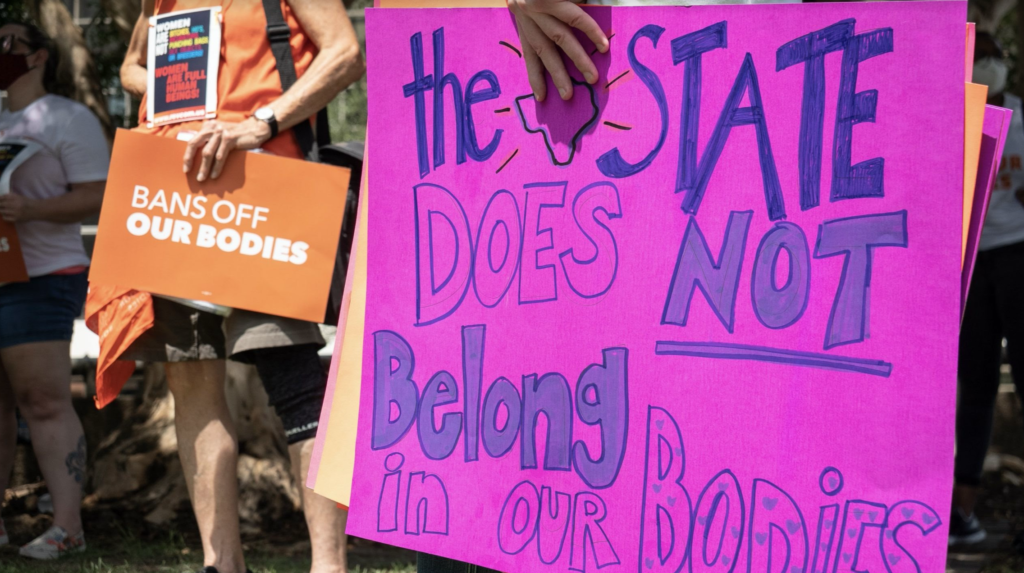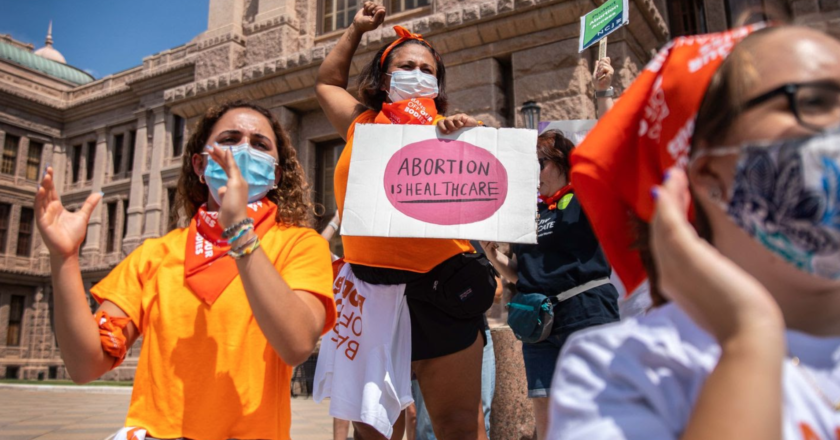On September 1st, 2021, the Texas Heartbeat Act came into effect, raising concern across the U.S. for those affected by this law. The act prohibits abortions after six weeks of pregnancy and allows for members of the public to sue anyone who performs or aids in an illegal abortion. Though the debate on whether or not abortion should be legal has existed for a long time, this recent judicial decision has led to more attention on the topic and a strict divide between the pro-life and pro-choice movements.
The act was first introduced on July 18, 2013, by Republican Phil King of the House of Representatives in Texas, however, it was not passed. This year, on March 11th, the Texas Heartbeat Bill was reintroduced and made a legislative priority of Republican lawmakers. Because of the majority the Republicans hold within both houses, the new legislation was voted in favor of and signed into effect on May 19, 2021. When brought to the supreme court, the vote counted 6 to 4 for the legislation and was ratified on Wednesday, September 1.
Under the Heartbeat Act, it is prohibited to receive an abortion if a heartbeat can be detected- which happens about 6 six weeks after conception. At around this time, a neural tube and a blood vessel has been formed in the embryo that creates a small pulse. This is what is referred to as the “heartbeat.” The embryo in this stage is not classified as a fetus until it finishes differentiating organs in about a month. Unfortunately, many women do not know that they are pregnant before this time. This makes it extremely difficult for women to fit the 6 week deadline. In most cases, by the time they find out they are pregnant it will be far too late for an abortion to be done. This law also makes it illegal for anyone to help the patient receive the procedure; this includes doctors, a staff member at a clinic, financial contributors, or even a driver who may take a patient to a clinic. They would be charged a $10,000 fee if sued and found guilty of the action. This abortion ban does make exceptions for medical emergencies, but not incase of a preganacy due to rape or incest.
Before the legislation was passed, there were around 24 abortion clinics, including Planned Parenthoods, that practiced in Texas. As of now, these clinics have halted their procedures after having an influx of patients who had hoped to receive an abortion before midnight on September 1 when the law went into effect.
After the law went into effect, it was met with heavy criticism and protest. Justice Sotomayor, who was one of the four judges who voted against the law, writes, “The court should not be so content to ignore its constitutional obligations to protect not only the rights of women but also the sanctity of its precedents and of the rule of law.” Many others across the country agree with her statement. A “Bans Off Our Bodies” protest took place outside the Texas State Capitol after the law was passed.
Across social media platforms, thousands of women have spoken out against the law. In particular, TikTok, a social media app, has been a major platform for activists to spread their message. Users on Tiktok have encouraged people to participate in online activism by flooding the Texas Right to Life website with fake information, memes, and pranks. While this form of protest has not proved to be largely effective, it has succeeded in spreading activism across the internet and garnering support against the ban.
This law not only affects the future of women within Texas but women across the country. Many women claim that the fear of their rights is becoming all too real. Clara Alger ‘21, a leader from Feminist Forum Club says, “This act makes me scared. Sometimes you push away the thought that laws which govern women’s bodies can happen, but once the law happens, it’s like a reality check.”
There are a handful of ways that you can do your part in assisting those in Texas, Alger advises, “If you’re eighteen and you want abortion rights protected, vote vote vote!” Other ways to help are by donating to charities that support those who can no longer receive abortions like the Lilith Fund, Jane’s Due Process, The Texas Equal Acess Fund, and others. Additionally, by simply spreading the word about the Texas Heartbeat Act and the negative effects it has on the rights of those who can get pregnant, you can make a difference.
Works Cited
Liptack, Adam, et al. “Supreme Court, Breaking Silence, Won’t Block Texas Abortion Law.” The New York Times, 1 Sept. 2021. The New York Times, www.nytimes.com/2021/09/01/us/supreme-court-texas-abortion.html. Accessed 29 Sept. 2021.
Rodrigues, Michelle. “The Absurd Pregnancy Math behind the ‘Six-Week’ Abortion Ban.” Scientific American, 4 Sept. 2021, www.scientificamerican.com/article/the-absurd-pregnancy-math-behind-the-lsquo-six-week-rsquo-abortion-ban/. Accessed 29 Sept. 2021.
“Roe v. Wade.” Wikipedia, 18 Sept. 2021, en.wikipedia.org/wiki/Roe_v._Wade. Accessed 29 Sept. 2021.
Stengle, Jamie, and Barbara Ortutary. “Activists focus on tip site in protesting Texas abortion law.” AP News, apnews.com/article/technology-health-media-texas-social-media-c76b1dc146ede0b2f1bac70e6b18f39f. Accessed 29 Sept. 2021.
“Texas Heartbeat Act.” Wikipedia, 29 Sept. 2021, en.wikipedia.org/wiki/Texas_Heartbeat_Act. Accessed 29 Sept. 2021.


